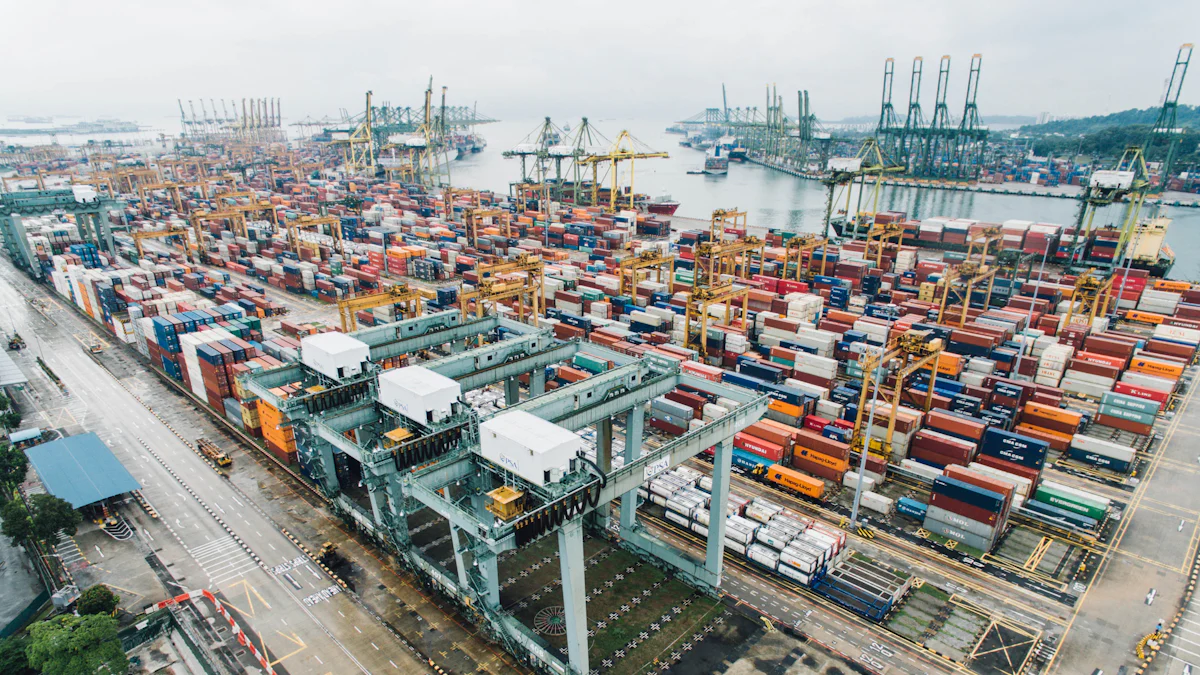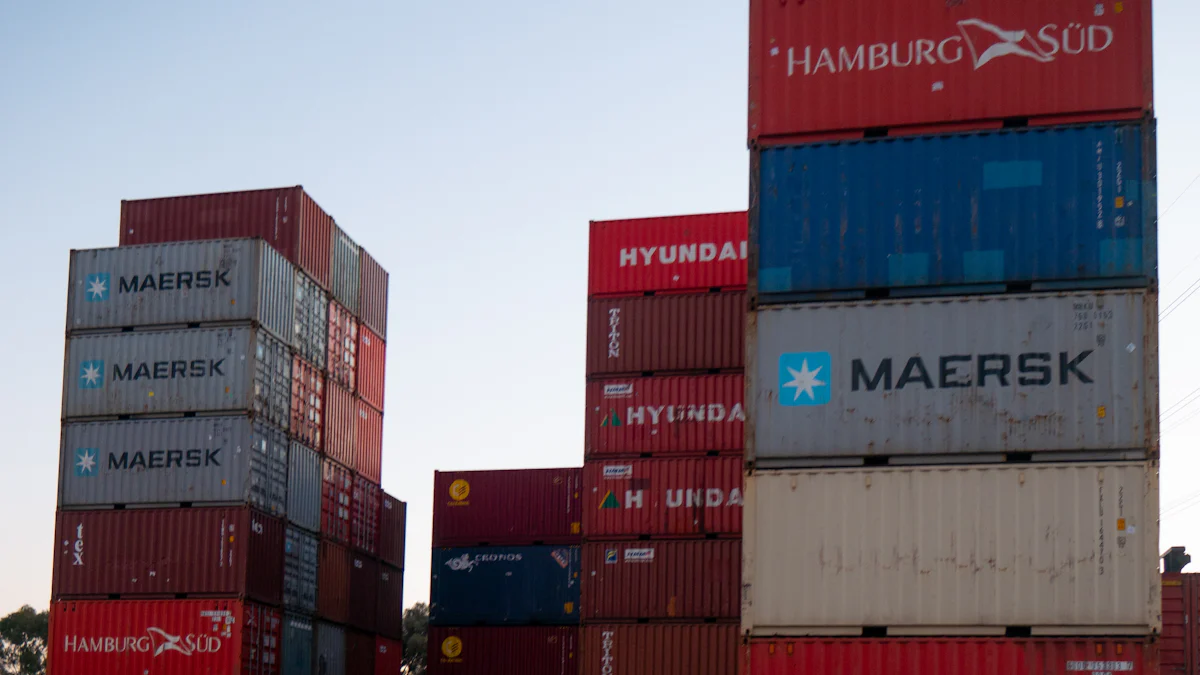How Overseas Warehouses Transform Global Logistics

The global logistics industry is experiencing unprecedented growth. In 2023, the market size reached approximately 9.41 trillion U.S dollars. Projections indicate that it will exceed 14.08 trillion U.S dollars by 2028. Overseas warehouses play a pivotal role in this transformation. These facilities enhance supply chain efficiency and reduce costs. Understanding the impact of overseas warehouses on logistics is crucial for businesses seeking to remain competitive in this rapidly evolving landscape.
The Role of Overseas Warehouses in Global Logistics

Enhancing Efficiency
Streamlining Supply Chains
Overseas warehouses play a vital role in streamlining supply chains. Companies strategically position these facilities to ensure efficient storage and distribution of goods. This strategic placement reduces the distance between products and consumers. As a result, businesses can manage inventory more effectively. Overseas warehouses also facilitate bulk stock storage, which optimizes order fulfillment processes. Companies benefit from improved logistics operations by utilizing overseas warehouses.
Reducing Delivery Times
Reducing delivery times remains a significant advantage of overseas warehouses. These facilities allow companies to store products closer to their target markets. Proximity to customers enables faster shipping and enhances customer satisfaction. Businesses can meet consumer expectations for quick delivery by leveraging overseas warehouses. This capability strengthens brand loyalty and increases competitiveness in the global market.
Cost Reduction
Lowering Shipping Costs
Overseas warehouses contribute to lowering shipping costs. Companies can consolidate shipments and reduce transportation expenses by storing goods closer to consumers. Bulk shipping from overseas warehouses minimizes the need for frequent international shipments. This approach leads to substantial cost savings for businesses. The reduction in shipping costs enhances profitability and supports sustainable growth.
Minimizing Inventory Holding Costs
Minimizing inventory holding costs is another benefit of overseas warehouses. Companies can maintain optimal stock levels by strategically managing inventory across multiple locations. This strategy reduces the need for excess inventory and associated storage costs. Efficient inventory management through overseas warehouses improves cash flow and operational efficiency. Businesses gain a competitive edge by minimizing inventory holding costs.
Expanding Market Reach
Access to New Markets
Overseas warehouses provide companies with access to new markets. Businesses can establish a presence in regions with high demand for their products. This expansion strategy allows companies to tap into emerging markets and increase their customer base. Overseas warehouses serve as a bridge for entering new territories and exploring growth opportunities. Companies can achieve international growth by leveraging these facilities.
Improving Customer Satisfaction
Improving customer satisfaction is a key outcome of utilizing overseas warehouses. Faster delivery times and reduced shipping costs enhance the overall customer experience. Businesses can offer competitive pricing and reliable service by optimizing logistics operations. Overseas warehouses enable companies to meet customer expectations and build strong relationships. Enhanced customer satisfaction leads to increased sales and brand loyalty.
Challenges of Using Overseas Warehouses
Regulatory and Compliance Issues
Navigating International Trade Laws
Overseas warehouses face significant challenges with international trade laws. Each country enforces unique regulations. Companies must understand these laws to avoid legal complications. Violations can harm corporate image and reduce operational efficiency. Businesses must invest in legal expertise. This ensures compliance and smooth operations.
Customs and Tariff Challenges
Customs and tariffs present another obstacle for overseas warehouses. Different countries impose varying tariffs on goods. Companies must calculate these costs accurately. Failure to do so can result in financial losses. Efficient customs management is essential. It helps in maintaining profitability and competitiveness.
Operational Challenges
Managing Inventory Across Borders
Managing inventory across borders poses logistical challenges. Overseas warehouses require precise inventory control. Companies must track stock levels in multiple locations. This complexity demands advanced technology solutions. Effective inventory management reduces costs and improves service delivery.
Communication and Coordination
Communication and coordination are vital for overseas warehouse operations. Multiple stakeholders are involved in the supply chain. Clear communication ensures efficient collaboration. Companies must establish robust communication channels. This enhances coordination and minimizes disruptions.
Strategies for Effective Utilization of Overseas Warehouses

Leveraging Technology
Implementing Warehouse Management Systems
Overseas warehouses benefit greatly from advanced warehouse management systems (WMS). Companies use these systems to enhance operational efficiency. A WMS offers real-time inventory tracking and automated order processing. Businesses achieve greater accuracy in stock management. This technology reduces errors and improves overall productivity. Companies that implement a robust WMS gain a competitive edge in the logistics industry.
Utilizing Data Analytics for Decision Making
Data analytics plays a crucial role in optimizing overseas warehouse operations. Companies analyze data to make informed decisions. This approach allows businesses to identify trends and forecast demand accurately. Data-driven insights enable efficient resource allocation. Companies can optimize inventory levels and reduce waste. The strategic use of data analytics enhances decision-making processes. Businesses that leverage data analytics improve their logistics performance.
Building Strong Partnerships
Collaborating with Local Logistics Providers
Collaboration with local logistics providers strengthens overseas warehouse operations. Companies partner with local experts to navigate regional challenges. Local providers offer valuable insights into market dynamics. These partnerships facilitate smooth supply chain operations. Businesses benefit from enhanced distribution networks and reduced transit times. Collaboration with local logistics providers ensures efficient and reliable service delivery.
Establishing Reliable Supply Chain Networks
Reliable supply chain networks are essential for successful overseas warehouse operations. Companies build strong relationships with suppliers and distributors. These networks ensure seamless flow of goods across borders. Businesses achieve timely deliveries and maintain high service standards. A robust supply chain network minimizes disruptions and enhances customer satisfaction. Companies that establish reliable networks gain a strategic advantage in global logistics.
Expert Testimony:
David Zheng, an expert in overseas warehouses and logistics, emphasizes the importance of understanding both risks and benefits. He states, "Companies must understand the challenges faced in operating overseas warehouses and try to find solutions."
Overseas warehouses transform global logistics by enhancing efficiency and expanding market reach. Businesses must strategically utilize these facilities to maximize benefits. Leveraging technology and building strong partnerships are key strategies. Companies that adopt these approaches will thrive in the competitive logistics landscape.
JUSDA's Approach to Overseas Warehouses
JUSDA's Technological Integration
JusLink Platform for Real-Time Collaboration
JUSDA has revolutionized the logistics industry with the JusLink Platform. This platform facilitates real-time collaboration among suppliers, manufacturers, and customers. The system integrates various stakeholders into a unified network. This integration ensures seamless communication and coordination. Businesses benefit from enhanced supply chain visibility and efficiency. The JusLink Platform empowers companies to make informed decisions swiftly. This capability leads to improved operational performance.
Cloud Warehouse Services
JUSDA offers cutting-edge cloud warehouse services. These services support multi-channel sales and distribution. The cloud-based system automates warehousing processes. Companies experience increased accuracy in inventory management. The platform provides real-time data access and analytics. Businesses can optimize stock levels and reduce waste. JUSDA's cloud services enhance logistics operations. Companies achieve greater flexibility and scalability.
JUSDA's Global Presence and Impact
Extensive Service Points and Warehousing
JUSDA boasts an extensive global presence. The company operates 155 service points worldwide. Over 2.5 million square meters of warehousing space supports international logistics. These facilities strategically position overseas warehouses in key transportation hubs. Companies benefit from reduced shipping times and costs. JUSDA's expansive network enhances market reach and customer satisfaction. Businesses gain a competitive edge in the global market.
Recognition and Certifications
JUSDA holds prestigious recognitions and certifications. The company is listed as a unicorn enterprise in the logistics industry. JUSDA has received the "Dingge Award Annual Industrial Platform Enterprise" honor. The company maintains national AAAAA comprehensive logistics enterprise certification. JUSDA also holds AEO enterprise senior certification and ISO9001. Membership in the World Freight Alliance further solidifies its reputation. These accolades affirm JUSDA's commitment to excellence in logistics.

JUSDA Solutions
To provide you with professional solutions and quotations.
Overseas warehouses have transformed global logistics by enhancing efficiency and expanding market reach. Strategic planning and technology play a vital role in overcoming logistical challenges. Businesses can streamline supply chains and reduce transportation costs through the strategic placement of international warehouses. Efficient operations in these facilities improve customer satisfaction and drive e-commerce growth. The future of global logistics will increasingly rely on the integration of overseas warehouses. Companies that adopt this strategy will gain a competitive edge in international markets.
See Also
Tomorrow's Logistics Revolution: AI Transforming Supply Chain
Revealed: Global Logistics Companies Ultimate Guide
Enhancing Warehouse Productivity: Logistics Robotics Power Unleashed
Revealed: JUSDA's New Warehousing Facilities Efficiency Unlocked
